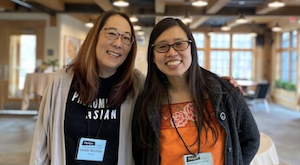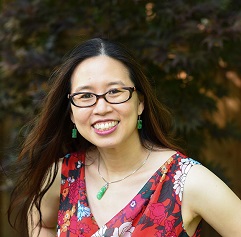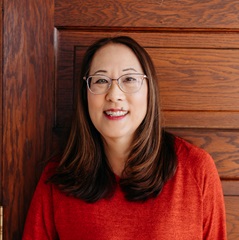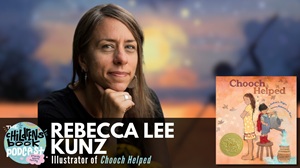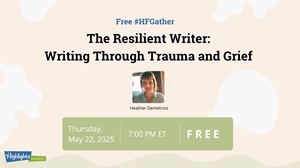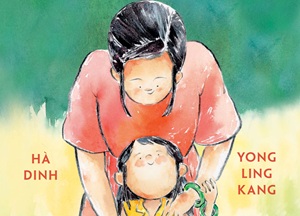What You’ll Find In this Podcast
Author Debbi Michiko Florence and Author/Illustrator Grace Lin were on campus for the Asian and Asian American Voices In-Community Retreat. George Brown hosted them on our podcast to talk more about their projects, the retreat they are hosting to celebrate this diverse and talented community, and their creative practices and works in progress.
Podcast Highlights
Debbi, on using playlists on the treadmill for her writing practice:
I create an entire playlist for the book for about an hour long. It was something I picked up from when I was in college. I learned that if you listen to the same thing and work in the same place, then your mind knows that, “Oh, I’m getting ready to work so.” For me the playlist is like oh, I’m working on Sweet and Sour, and now I’m going to think about that. And then for the new project, then I’ll make a whole new playlist and I won’t repeat songs.
Grace, on her writing practice and how it differs from Debbi’s:
…It’s so fascinating cause you said you’re a rule follower, but you are a pantser. And I am not a rule follower and I’m completely undisciplined, but I am definitely a plotter.
Grace, on her upcoming course about Viewing Children’s Books Through an Intersectional Lens:
Laura Jiménez, who did this critique of a picture book illustration; it just opened my own eyes… she pointed out; she showed this beautiful spread of a book, which I I’ve seen many times, like, “Oh, how nice.” And she’s like, I know this is a lovely picture, but do you notice, all the girls are drawing? All the boys are playing ball. Do you notice the Black woman has kids? There’s no Black man. You know…I know for sure the illustrator has no meaning to reinforce these harmful stereotypes, or just reinforce these stereotypes in general. But these are the things that we all need to think about; and especially as creators, that we don’t think about when we’re creating cause we’re just so busy going with what we’re used to. So it’s just a fascinating course.
Full Transcript
George Brown: Welcome to The Highlights Foundation Gather podcast, where our mission is to positively impact children by amplifying the voices of storytellers who inform, educate, and inspire children to become their best selves. We’re broadcasting from studio four at the Highlights Foundation, Retreat Center, today’s guests are Debbie Michiko Florence and Grace Lin, welcome. So, both Debbie and Grace are here today on retreat, and we’ll talk about that a little bit. But before we get started, I just want to jump in and get to know you a little bit as writers and writer illustrators, Debbie tell us a little bit about. You and your writing.
Debbi Michiko Florence: I am an author of chapter book series and middle grade fiction and also have co-authored a picture book biography. All my characters are Japanese, American and. Most of my story center around friendship and family, and for the older kids first crushes. I’m currently working on several projects that I can’t really talk about right now, but I’m very excited that soon I think I’ll be able to share about them.
George Brown: And what do you mean by that? Like they are under contract or you’re getting ready to submit again.
Debbi Michiko Florence: They are under contract, but they have not been formally announced yet. The publishers like to be the ones. To announce it, so I’m just working.
George Brown: But these are final manuscripts that are in getting there.
Debbi Michiko Florence: They’re still drafts. I just turned in a first draft of something to an editor, and I’m working on a couple of. First draft things and then have a couple of other things that are I’m waiting for revision letters.
Grace Lin: Oh so, what’s your most recent published book?
Debbi Michiko Florence: Most recent published book would be Jasmine Taguchi, Peacemaker and the reason why I paused is because I had a different title and it was changed and I keep saying the old title so I do in my chapter book series about Jasmine Taguchi. I have 4 new ones that two have come out and have two more coming out and in the newest quartet, Jasmine. Is traveling to Japan on vacation with their family, so yes, it is fun.
George Brown: Ohh fun. Alright well Grace, This is fun. This is a podcast trade and I listen to you and Alvina and I always find myself laughing along with you. And so like, I think that’s the sign of a good podcast, right? When you can get brought in. But I remember you were here a number of years ago, and you were, I think that was the kid lit women podcast you were working on.
Grace Lin: The serious one.
George Brown: But so I listened to that whole series and that kind of inspired us to get started. I think you even recommended the book and the machine to get started on the podcasting. So this is fun to actually have you podcasting.
Grace Lin: I’m honored that you have a podcast that that I feel like I had a little a little help and getting you started. With this so this, that’s very that’s very nice. So thank you for having me.
George Brown: I heard you talking a little bit about Chinese Menu, which is one you have coming out soon.
Grace Lin: So I’m author and illustrator Grace Lin. I write and illustrate all kinds of books from board books to middle grade novels. Most people know me as an author, But most people know the books that people know. Mine is usually where The Mountain Meets the Moon, which was a Newbery Honor all the way back in 2009, and I like to Lord over the fact that I been doing this for over 20 years. That’s my I don’t know if I was to Lord it, but I feel like that’s my badge of Honor.
Debbi Michiko Florence: Well, didn’t you recently receive a legacy award?
Grace Lin: And last year, I received the ALA Legacy Award. Which my husband likes to joke a lot about, he says. Well, you know, now you’re done, you know, and I was. Like, well, OK.
George Brown: There’s still legacy to be had, right?
Grace Lin: And I hope there is still legacy to be had because I have a new book coming out in the fall of 2023, which is this year. So it comes out in September and I’m super excited about it. I feel like it might be my best book ever its caalled “Chinese Menu” and it’s an anthology of 40 short stories all about the legends and histories and myths behind your favorite Chinese food. So for example, like if you’ve ever eaten at a Chinese restaurant and you order dumplings, you’ll notice, like all the dumplings are kind of ear shaped. And the reason why they’re ear shaped Is because dumplings were actually invented by an ancient Chinese Doctor Who invented them as Medicine to cure people’s frostbitten ears. And so you know, he filled up with warming herbs and like warming spices and all these and thinking that he could warm you from the inside and cure your frost bitten ears. I don’t know how well they worked for the ears, But people love the dumplings and we still eat them to this day. So those kind of stories that are in this book, and. So I’m really proud of it. So they’re all true legends. So people like it’s a nonfiction I’m, like, kind of. I mean, there’s like Dragons and phoenixes and monks. So, like, you know, it’s true legends not true history.
George Brown: So when you say anthology though, did you write each of those short stories?
Grace Lin: Yes, I guess I don’t know if; I’ve been saying anthology because I’m trying to say like a I guess I. Should say collection, yeah, OK, not anthology. I better go back and change all my marketing now.
George Brown: And are there illustrations included?
Grace Lin: Yes, it’s completely illustrated. It’s full color. The whole thing. I just realized you know I have put anthology on like everything and now I’m realizing I’ve completely used it wrong. Sorry, everybody. Well, they’ll be surprised.
Debbi Michiko Florence: Surprised also when is that?
Grace Lin: Coming out that comes out in September 2023.
George Brown: We look forward to that. Everyone tells us that the Highlights Foundation that we should do, a cookbook, but maybe we’ll just sell your book.
Grace Lin: Well, that’s what’s so interesting as people think it’s a cookbook. There is one recipe in it, and I’ll have recipes available on my website, but it’s not. It doesn’t really have is. There’s no not really recipes in it because it’s supposed to be about the food that you get at a Chinese restaurant that’s called Chinese menu. So that’s been kind of a like. I I don’t want to like fool people and have people like where is the recipe?
George Brown: OK. Well I can imagine even my sister-in-law, she’s a doctor of Chinese medicine, so she would love like that dumpling story you tell. I think it’s like right up her alley. So I love that. And now let’s talk a little bit about your writing practices. So, Debbie, do you have a day job?
Debbi Michiko Florence: My day job is my writing job. I get to be a full time author, which makes me really really happy and shout out to my husband who did all the financial heavy lifting for many years so that I could chase this career and chase this dream, and now that he’s started his own business, I get to help support him and the family.
George Brown: I love how that works. And so are you a regular daily writer then? Or you have a practice?
Debbi Michiko Florence: I do. I am an early morning person. I think Grace is too. I naturally wake up around 4:30 or five. Every morning and I spend the first hour getting everything else out of the way, like the social media or emails so that it’s I’m not thinking about it. And then by 7:30 or so, I’m in my I have a writing studio called the Word Nest, and I hunker down there and I work every morning. Without fail, until lunch and then after lunch, depending on if I’m on deadline or not. If I’m on a deadline then I also work in the afternoons, but if I don’t have a deadline looming, then that’s when I get other things done, but yes.
Grace Lin: I have a question. That’s why I am raising my hand. So before you write, do you have a writing ritual? That’s something I’ve been thinking about.
Debbi Michiko Florence: So when I’m first drafting a novel, I create a playlist to listen to, and then I now run on a treadmill. And I listen to the playlist, the reason why I run on a treadmill is because then I can space out completely and I listen to the music and the music gets me in a certain emotional way of whatever my story is about. And then I kind of daydream and I kind of figure out what the next scene is because I am not an outliner. I am a pantser. I have a premise and some characters and a vague idea of where the story is going, but every day when I get up on that treadmill and run and listen to my playlist, I kind of figure out what’s happening next. So that is my ritual. I used to meditate and don’t ask me why. And the pandemic hit I stopped my practice. I’m trying to get back to it, but yeah.
George Brown: Does that playlist stay the same? Throughout the whole book project or. Are you creating a new one every day?
Debbi Michiko Florence: Well, no, it’s the same playlist for the book. I create an entire playlist for the book for about an hour long. It was something I picked up from when I was in college. I learned that if you listen to the same thing and work in the same place, then your mind knows that, “Oh, I’m getting ready to work so.” For me the playlist is like oh, I’m working on Sweet and Sour, and now I’m going to think about that. And then for the new project, then I’ll make a whole new playlist and I won’t repeat songs.
George Brown: OK. So and then, how do you shift between projects?
Debbi Michiko Florence: I try not to be first drafting to fiction projects at the same time I can. I can like work on 2 middle grade novels, but one will be first draft, one will be either revision or at the line netting stage. Or I could do like a non fiction project or a, you know, picture book and a a novel and then whatever requires the most creative heavy lifting is what I start the day with. So anything like first drafting or revising a novel, and then if I’m doing like line edits or past pages or something nonfiction that needs research, that’s the afternoon and pretty much I hit a wall between 2:00 and 3:00.
George Brown: I love that; the only thing, sometimes I try to take care of emails first thing and then the whole day is gone. So I like that ability to like turn it down and go back to the real work.
Debbi Michiko Florence: Well, you probably get way more. Emails than I do; yeah, I give myself an hour to do any social media type if I have to post something and emails I’ll attend to. I do have some friends that I e-mail with back and forth and those get done in the later, in the day when I’m done working.
George Brown: And grace. How about you? Do you have a practice or a schedule?
Grace Lin: I wish; like I listened to yours. I was like, gosh, that sounds so disciplined and so clean. And I mean the. I get up early. I get up around 5:00 every morning and I eat usually and I try to do some exercise. I think those once I get the exercise clicked checked off, I’m like OK, I’m good like because I know if I don’t do it like pretty early in the morning, then it’s not going to happen. First thing I get up, I try to do some kind of exercise. I usually either go to. Some kind of class or. I or I run. UM and then honestly, it’s like a hodgepodge. Every day it’s different. My daughter is 11 now, and it’s a lot of juggling of, like, Girl Scout cookies and juggling, like, who’s going to pick her up there. And then my husband is a stay at home Dad. So you know, it’s he’s, he’s great, I don’t want to disparage him. He’s great, but he’s management is not like his strong point. He’s like a doer, you know? Like, so it’s kind of like. OK, you know this is the calendar today and do that so like UM, so it’s a lot of that kind of managing and then it’s a lot of. You know, it’s so it’s just a lot of business stuff and. Like you, George, you’re saying. Like there are days. I just like, OK, I have to answer emails and then I’ll it’ll be like, 5:00 o’clock and I’ll be like, where does the day go?
Debbi Michiko Florence: Yeah, I don’t get nearly as many emails as the two of you.
Grace Lin: Well, it’s not just as in emails, you know, it’s just like finance. Like I had to, like, pay bills and deposit checks, you know, like all of a sudden. It’s just like, you know, and so. So I have to say so. A lot of what a lot of people ask me is like, oh, grace, how do you do it all? Sometimes, like you know, there are certain things that I realized early on that like you just are going to fail at; and I just want everyone to know that I chose to. Fail at having a clean house like and. And like people like. Oh, you know, they just think it’s like a little untidy, but no, no it’s not. It’s really, really untidy. Let’s put it that way. Like, I mean, it’s not, it’s not unhygienic or anything, but it’s messy and like it’s to the. Point where like. I’m kind of embarrassed, like, I don’t mind it because I live in it like, but like, I don’t like to like, have people over, you know. But I it’s kind of like where I have realized, OK, you can either put the energy to have a clean house that’s acceptable for people to come over to, or you can write. And so that’s what I’ve chosen. So yeah!
George Brown: Put it into the books.
Debbi Michiko Florence: I mean, yeah, the only time my house is clean is when, like, I’m procrastinating.
George Brown: Do you have an office in your house or you? Have a separate studio. Like when you do need to get the creative work done?
Grace Lin: So I do I have the whole third floor is the attic that we changed into my studio and what’s really nice is like there’s a bathroom up there too. So which that’s very useful, especially when I’m painting, you know, like. So I don’t have to like, run downstairs to clean my brushes and then come back up so. So it’s almost like having my own teeny apartment in the third floor, and I even have, like, my zoom room there now. Since the pandemic there was we used to have like a dead closet space up there that we transformed. So yeah, it’s really a office space. Up there for me, so I feel very lucky.
Debbi Michiko Florence: So if we can get back to that though. So when do you? I mean, what motivates you or what spurs you on to like, focus on whatever project you’re working on, whatever.
George Brown: Has to be done next.
Grace Lin: Plus when you were saying how, like I wish I could be like. I feel like so much of the time. I’m just like. Always putting out fires. You know, it’s like, oh, OK, uh, luckily I’ll be like, oh, that fire like, I know, luckily I kind of have an idea of how much time I’ll need to put out a fire, you know. Like that fire. I need all of this month to build that fire, you know? And so then I’ll just go full steam ahead on that. But yeah, I’m I don’t have a disciplined practice.
Debbi Michiko Florence: For you, because obviously you’ve written some and illustrated some amazing books, and I feel like whatever your personality is, you work with it because for me, I know everyone’s like, oh, you’re so disciplined in all that. I have always been a rule maker and a rule follower. It drives my husband well early in our marriage, it used to drive my husband nuts when he was because when we first got married he was 38 and he like. I’m 38 years old cause I’m like ohh you should fold your clothes. And put it over here and he’s, I’m 38 years old. If I want to drop my clothes on the floor, I’m going to drop my clothes on the floor. So I am a role maker and a. Rule follower so that works.
George Brown: For me, yeah. And I think that’s one of the things that is good for us to get across to writers that are listening and and creatives and illustrators like, there is no one, right. Way it’s how do you build the practice to meet your person.
Grace Lin: Yeah, but you know, it’s so fascinating cause you said you’re a rule follower, but you are a pantser. And I am not a rule follower and I’m completely undisciplined, but I am definitely a plotter.
Debbi Michiko Florence: Well, maybe that’s my way of breaking out of rules because it’s the one time that I can just, like, do whatever and have no plans. I have tried to outline because I’ve been told that I would probably be able to write. Master, if I outlined because they spend a lot, sometimes I go in a totally wrong direction, like 5000 words and I’m like, whoops, that’s not what should happen. I’ll have to delete 5000 words and go the other way, so I tried to outline and I outlined an entire novel. And then I no longer felt like writing it because I already knew exactly what’s going.
Grace Lin: Oh, that’s so interesting because I love having, like, right now here. It highlights like I’m going to write something, but like I can’t write it because I haven’t figured out everything, and so instead I’ve just been, like, walking up and down this the road, thinking like, OK. Thinking and thinking and thinking and. I’m like I have. When I come home, like how? Many words you write. I was like 0. But I’ve been working on it really.
Debbi Michiko Florence: Thinking about it counts, but that’s interesting, though. Yeah, that’s kind of like Bunny.
George Brown: So now tell us your story that you told me this morning about the last time you were.
Debbi Michiko Florence: What story comes? What?
George Brown: Oh you came to me this morning and you said last time I was here, either you had two great ideas or you got 2 great offers.
Debbi Michiko Florence: I got two offers, yes. So I was here on a personal retreat trying to get some work done. And I was waiting. You know how it is. You submit stuff or you have your agent submit stuff and you’re waiting and waiting and waiting and had several things going on. And then I got. A phone call from my agent who only calls me either with really horrible news or really good news. Not horrible news, but so I picked up and she’s like, we got the book offer. You’re waiting for woo and it was a really happy, happy, happy offer.
George Brown: Oh, that’s fantastic.
Debbi Michiko Florence: And I was here with Susan Tan and she was in the next cabin. I knocked on her door and like, oh, I got good news and we’re like. Hey, I’m like, OK, I’m going to go back to work and then not less than an hour later, my agent calls back. She goes hey, we. Got more good news? Got another book off. I’m like what? And so I feel like Highlights is just like magical. If it’s not like book offers coming in, it’s like getting to finish a project that I didn’t think I was going to finish or, you know, making headway on a project that I was stuck on, even The Walking around. It’s so inspirational. Right. You’re alone in your head with no responsibilities. So I just feel like, yeah.
Grace Lin: Magic. Yeah. No, I. I love highlights. Too, because I was saying how, you know, I don’t have a a disciplined like study or disciplined practice. This but like I can see when I have a fire I’m going to put out and very often I’ll be like, OK, I better book. I better book like 5 days at a high life and just go there because that’ll be because that’ll be the only way I can just concentrate only on this and finish it. So it is pretty magical here, I think. This is my favorite retreat place. I’ve gone to many, and this is definitely my favorite.
Debbie Michiko Florence: My favorite same here.
George Brown: Now you see that listener we didn’t mean for. This great commercial about the Highlights Foundation. But we’ll take it. But a lot. Of that I mean how great that you got phone calls while you were here. And so you’ll have fond memories of being at the Highlights Foundation when you got these book deals, but a lot of it is just freeing yourself from home to have the space and the time to be able to get. That done and.
Debbi Michiko Florence: And food and also the fact that I don’t want to say isolated, but that there’s nowhere easily to go somewhere like in my car.
Debbi Michiko Florence: Like I’m going to go get ice cream. Which you can get in the barn, by the way. But I right now I’m working on. Search for a new project and for me it’s the hardest thing for me to do is sit down and do the research and know whatever. I would rather just be like making stuff up and writing a novel, but at home, if I were doing this, I would go scrub a toilet or I’d go take the dog for a walk. Or maybe I’d watch some television. But I can’t do any of that here, so I better work.
George Brown: Your only distraction is a podcast interview, alright.
Debbi Michiko Florence: Well, now I’m done working. It’s past my work hours, so.
George Brown: And we I’ve heard people talk about like. How do you how do? You get that mini retreat concept into your daily or weekly life like it’s hard at home, right to get that freedom.
Grace Lin: Yeah, I don’t think you can. Yeah, I mean, that’s what retreats are for. Like, I feel like it’s you just do the best you can and then you go on.
Debbi Michiko Florence: I’m already thinking about. I think I’m going to need to come back this fall.
George Brown: Well, Speaking of which, let’s talk about why you’re here. We are hosting are you are actually the two of you are hosting, right?
Debbi Michiko Florence: The Asian American Voices in community retreat. Yes, it is awesome. Yeah, this is.
Grace Lin: And I think that was your idea, Debbie.
Debbi Michiko Florence: Well, it was a selfish idea because I it was something I wanted. I was at Chili’s many years ago and it was the first time I was in a room with, you know, BIPOC Community and it was such a different feel and years went by and I know that there are other in Community retreats here. I’m like, hey, we should have an Asian American one, and I had reached out to Alison, I think to say, is this something we can do? And she said. And then I said I’m going to call Grace Lin and then I think I reached out to you and you were you Were also into it.
Grace Lin: I was like, sure.
George Brown: And so we do have a number of in Community retreats and what we’re finding is it’s a way to build community. So the Muslim Storytellers Fellowship was just here, and one of their takeaways was thinking about how they go forward and think of themselves as almost like creating some sort of an organization. Their group, but so that there’s a network of support for other Muslim writers and illustrators who are thinking about kid led or who are in kid lit. And so it feels comforting to know that there’s a way to build and strengthen community to expand the seat at the table to bring more voices into kid lit.
Grace Lin: Yeah, you know, I, you know, honestly, I was just, like, really happy just to be like with, like, all these Asian authors and illustrators as I was like, oh, yeah, we could use this to like, straight because in the community in the outer community, too, as you were saying, I was like, yeah, we should do that.
Debbi Michiko Florence: Yeah, because our inaugural retreat was last year. I Had planned to do it in 2020, was going to be the first year and of course you know happened there and then. So last year was the first time we got to do it and we were just kind of like dipping our toes and I think and we decided because we were talking about possibly having. Workshops or whatever it was right and we thought, you know, what would be really nice is just to be together. Because we had just come. Well, it’s still happening, but the anti-Asian hate going on and I felt like what a wonderful place to be feeling safe and just relax and just create. And so that’s what decided to do. And then we had talked afterwards and thought, you know what, I think this is working. So let’s keep the same. But now I think we’re.
Grace Lin: Starting to think even now just starting to think what, where, where else can we go?
Debbi Michiko Florence: Yes, definitely thinking bigger and how else can we provide support and amplify and what can we do?
George Brown: And along with the retreat, we also created an Asian American writers scholarship last year, and we did that again this year. And then we also created a Pacific Islander scholarship. And so both of those scholarships were part of the greater Highlights Foundation Scholarship program. But that’s one more way to bring more voices into kidlit.
Debbi Michiko Florence: And you know, a shout out to you and the Highlights Foundation and the staff I feel. In the past year, just watching the support for all writers and the authors and illustrators and creators, and providing a place for everybody to feel safe and be able to create, and also the workshops that you all do, I. Have said this before, but I don’t know that my first, my debut middle grade novel, which came out during the pandemic, but I don’t feel like I that would have sold when it did. And without the whole novel retreat, I had been struggling with that book for a very long time, and it was this whole novel retreat that I took here that really helped me kind of see it in a new way and be able to revise it in a way that it sold like, immediately. Yeah, after so many rejections.
George Brown: I love that.
Debbi Michiko Florence: So that’s funny.
George Brown: My one of my earliest memories of you, Debbie, is when you we were outside of the cabins and you said we really need a World building workshop. And sure enough, I think we created a World Building workshop after that recommendation.
Debbi Michiko Florence: It was so awesome and I came. I came to that. It was absolutely awesome, yeah.
George Brown: So are you teaching a? Workshop for us this year or I?
Debbi Michiko Florence: No, it was last year. I Co-teach the Writing chapter Book series workshop yes.
George Brown: That’s it. The series.
Debbi Michiko Florence: Yeah, which, you know, I started off as a student attendee and I did at one point in one of the workshops I thought, wouldn’t it be really cool someday? I got to teach something here and my dreams have come true, yeah.
George Brown: And then Grace, I think you’re coming back in June for the intersectional Lens workshop.
Grace Lin: Where I’ll be kind of the was gonna say flaky because the other participants are Like social justice teachers and educators that. Are like so on the. Ball of what is needed and what is out there and I’m kind of the one that’s.
George Brown: And that that is that is a slightly different workshop for us because it’s not specifically craft, it’s more like a broader lens on looking at the intersectionality of books, I think it’s specific for picture books or it’s it might go through middle grade.
Grace Lin: It’s nice, it’s mainly picture books, but we do have a couple of middle grades that I think we talk about.
George Brown: But you’re providing the author illustrator perspective and then we have educators and professors kind of providing that also kind of a broader academic perspective on thinking about. Books in the classroom, books in discussion, and how those books are used. And there’s such a kind of that deeper critical look at a book that really was amazing the first time I sat through that course to.
Grace Lin: Yeah, it is.
George Brown: See what that looks like.
Grace Lin: It’s like, it’s just completely amazing. I mean, Laura Jiménez, who did this critique of a picture book illustration; it just opened my own eyes… she pointed out; she showed this beautiful spread of a book, which I I’ve seen many times, like, “Oh, how nice.” And she’s like, I know this is a lovely picture, but do you notice, all the girls are drawing? All the boys are playing ball. Do you notice the Black woman has kids? There’s no Black man. You know…I know for sure the illustrator has no meaning to reinforce these harmful stereotypes, or just reinforce these stereotypes in general. But these are the things that we all need to
think about; and especially as creators, that we don’t think about when we’re creating cause we’re just so busy going with what we’re used to. So it’s just a fascinating course.
George Brown: And that the I’m excited about the mix because we have librarians, we have educators, we have picture book creatives and we have some publishing professionals actually joining in. So there’s a real neat interplay between the participants and how the whole piece works out. So that’s the intersectional lens. Workshop in June. And this is the Asian American voices retreat happening now. Did you have your fireside chat yet?
Debbi Michiko Florence: We had, we had a little bit of trouble remembering the schedule, but now now we have.
Grace Lin: Yeah, thank goodness.
Debbi Michiko Florence: Got it. Yes. Yeah, yes.
Grace Lin: Molly RA was like, no, that’s tomorrow.
George Brown: So you’re both working on an idea here. You’re walking around thinking about the idea. Are you writing?
Debbi Michiko Florence: I mean, a couple of things I’m researching for a new project that I can’t talk about yet, and I’m also doing past pages for book eight of Jasmin Taguchi, which is when you look at. The how the pages laid out how it’s going to be printed out and make sure there are no mistakes and the illustrations match the text and then I think I’ll get a second look and then it will be published this. September, so I’m excited.
George Brown: Well, thank you, Grace Lin and Debbi Michiko Florence for being with us in studio four at the Highlights Foundation. For having us. Have a great time at dinner.



